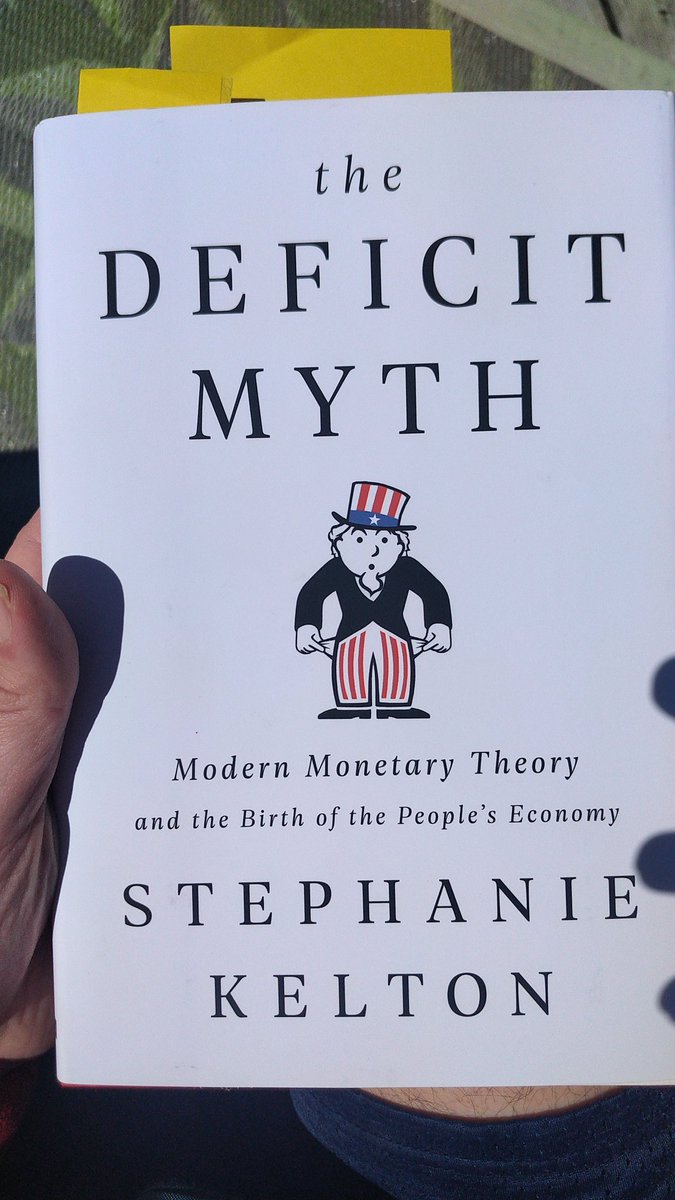A simple lit head reads, The Deficit Myth: Modern Monetary Theory and the Birth of the People’s Economy by Stephanie Kelton.
As a simple lit head experiencing lockdown, I’ve been reading Stephanie Kelton’s book: The Deficit Myth.
I’ll state right off the bat that I’m no economist, but luckily Kelton is, and while I’m sceptical of advocating too much on a subject in which I myself am not formally trained, I think that there are a lot of interesting ideas to take away from this book.
This article is not going provide all the answers in its 700 words, but it will hopefully get you thinking about just how deficit myths, Modern Monetary Theory, and the birth of the people’s economy might be feasible. Possibly.
So, as I mentioned Kelton is an economist.
According to Wikipedia, she’s currently Senior Fellow at the Schwartz Center for Economic Policy Analysis and is one of the leading proponents of Modern Monetary Theory.
Perhaps more interestingly, Kelton was also a senior economic advisor to Senator Bernie Sanders during his 2016 presidential campaign and now she’s written a book.
In The Deficit Myth, Kelton tries to clarify the tenets of Modern Monetary Theory (MMT), and by doing so, reveals some of the misguided assumptions that allegedly underlie conventional economic wisdom.
You might have noticed that the Australian and global economy has been a tad stagnant for a few years now.
There has been persistently low wage growth and persistently low inflation in Australia for the past decade. Were it not for China’s rapid economic expansion we might be in a spot of bother. To be sure, all of this predates COVID-19.
To redress this lacklustre growth, ensure a more balanced economy, and solve pressing social problems Kelton argues for the implementation of MMT.
At its core, MMT attempts to reframe the so-called ‘deficit myth’ that is pervasive in government thinking of most political persuasions.
The ‘deficit myth’ is the idea that running successive deficits (where government spending is greater than their revenue) is a sign of economic mismanagement, whilst running successive budget surpluses is a sure sign of safe economic management. In short: surplus good, deficit bad.
This is based off the misguided idea that the government should budget more or less like a household. According to Kelton, this sort of thinking is misguided because the Australian Federal Government is not like a household since it has control over its own currency.
The Australian Government can print more money; a household cannot. This means that unlike a household, the Australian Government can always find the money to pay for the projects that it thinks it really needs to pay for.
Importantly, this shifts the question from “how can we pay for it?” to “what should we pay for?”
Because MMT does not for a hot-minute suggest that the government can spend its way out of any and every problem. To the contrary, if the federal government were to run the printing press non-stop, all day, every day, then the results would doubtless be bad.
Simply printing more money willy-nilly would lead to hyperinflation, the devaluation of the Australian Dollar, and very likely, the collapse of the economy – Weimar Republic style.
The trick is finding where the point of overspending is and where inflation will start to take off.
Inflation will occur, according to the theory, when the economy starts to move beyond its real productive capacity. However, it looks like we have not recently been anywhere near reaching this full capacity.
The Australian Reserve Bank has underperformed on its inflation rate target of 2 to 3 per cent for several years now. With interest rates stubbornly low in Australia and around the world, inflation is not really an issue at the moment.
Because the Australian economy is below full employment (hence low inflation) there is a whole bunch of wasted potential. The resources that could be used to solve problems and create collective wealth are sitting idle.
If MMT is correct and the Government can always find the money within reason, and inflation is not an issue, then financing important projects is really a matter of political will rather than economic feasibility.
If big issues like climate change action or education or healthcare are pressing enough then the government will be able to find the money to fix them, if they care to do so.
Campbell Williamson supports big sunblock in its fight against the big sun.
Words by Campbell Williamson

